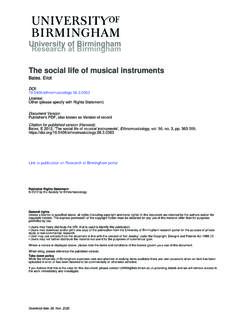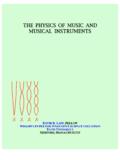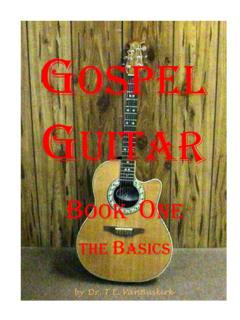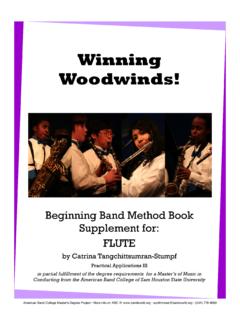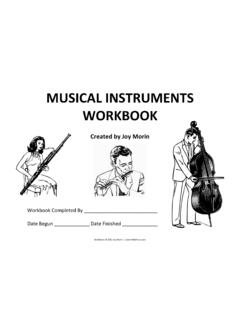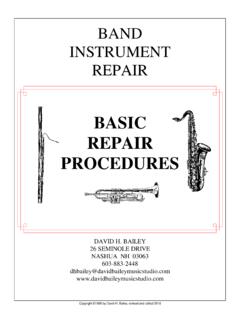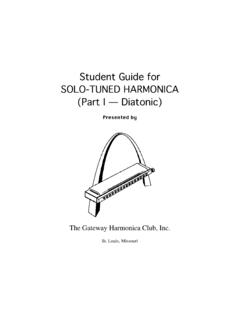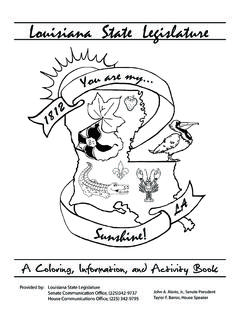Transcription of Action, Criticism & Theory for Music Education
1 action , Criticism & Theory for Music EducationThe refereed scholarly journal of theVolume 3, No. 1 May 2004 Thomas A. Regelski, EditorWayne Bowman, Associate EditorDarryl A. Coan, Publishing EditorElectronic ArticleDoes Everyone Have a musical Identity?Reflections on musical IdentitiesTheodore Gracyk Theodore Gracyk 2003 All rights content of this article is the sole responsibility of the author. The ACT Journal, the MayDay Group,and their agents are not liable for any legal actions that may arise involving the article's content, includingbut not limited to, copyright 1545-4517 This article is part of an issue of our online journal:ACT Journal the MayDay Group website at: , Criticism & Theory for Music Education Electronic Article Page 2 of 21_____Gracyk, T.
2 (2004). Does everyone have a musical identity? Reflections on musical Identities. Action, Criticism , and Theory for Music Education . , #1 (March 2004). Everyone Have a musical Identity?Reflections on musical IdentitiesTheodore Gracyk, Minnesota State University, Moorhead"What really matters is what you like, not what you are like." Rob Fleming, narrator of Nick Hornby s High FidelityIRaymond MacDonald, David Hargreaves, and Dorothy Miell commissioned tenoriginal essays for musical Identities and contributed a splendid introductory essay oftheir Because the project arose from a series of research seminars funded by TheBritish Psychological Society, a dual shared perspective unifies the eleven pieces. Theyare essays in the psychology of Music (something not apparent from either the title or thebook jacket), and they presuppose (or at least do not challenge) a social constructionistview of identity.
3 The editors divide the essays into two groups: those on developingmusical identities ( identities in Music involving recognizable social and cultural roles,such as that of a pianist, conductor, or composer), and those on developing identitiesthrough Music ( Music in identities where Music plays a role in creating a non-musicalidentity, as when Music contributes to the articulation of gender and ethnicity). I willhave relatively less to say about the essays on identities in Music and somewhat more tosay about those on Music in identities. Because I am not a psychologist, nor in any otherway a researcher in the social sciences, my reflections on the book are going to be rathermore speculative than the essays in musical four chapters on identities in Music illuminate the processes involved inbecoming a musician.
4 But that in itself raises an issue that troubles me. Identities inmusic are routinely conceived in terms of a dichotomy between musicians and non- action , Criticism & Theory for Music Education Electronic Article Page 3 of 21_____Gracyk, T. (2004). Does everyone have a musical identity? Reflections on musical Identities. Action, Criticism , and Theory for Music Education . , #1 (March 2004). , a dichotomy explicitly formalized in Alexandra Lamont s musical Identitiesand the School Environment. Ostensibly a study on how children s perceived musicalidentities develop over time and under different conditions (41), Lamont s questionspresuppose a very specific concept of musical experience. 2 The presupposition ismasked by Lamont s justification of her approach:[S]ince children were engaged in an amount of musical activity at school as partof the Curriculum, the traditional labels of novices and experts were clearlyinappropriate, since even the novices had a certain musical experience.
5 So Iasked the children a series of short questions about their musical backgrounds(47).Lamont asked the children whether they had Music lessons outside of Music class inschool, and whether they had any ability to play a musical instrument. Based on theirreplies, Lamont put the label non-musician into the mouths of those who answered bothquestions negatively: Almost half the children (48%) described themselves as non-musicians, saying that they did not have lessons and did not play a musical instrument (47, emphasis added).Does the evidence show that the children described themselves as non-musicians,or is Lamont imposing a standard cultural identity that the children have not themselvesinternalized? Do we escape inappropriate stereotypes by replacing the distinctionbetween novice and expert with one between musician and non-musician?
6 (Would weconduct a study in which we ask children if they own dogs or cats, and then concludestraightaway that those without dogs and cats have no pets?) My questions may seem toraise a difference without a useful distinction until we consider other research that doesnot confine musicianship to playing instruments . None of the authors in MusicalIdentities cite Patricia Shehan Campbell s monograph, Songs in Their Heads, anethnographic study that documents and explores the rich and varied modes ofmusicianship in children s Drawing on Christopher Small s catholic notion of musicking (a verb coined by Small to cover any activity relating to Music ),4 CampbellAction, Criticism & Theory for Music Education Electronic Article Page 4 of 21_____Gracyk, T.
7 (2004). Does everyone have a musical identity? Reflections on musical Identities. Action, Criticism , and Theory for Music Education . , #1 (March 2004). that children engage in a wide variety of musical play and that singing is central tothe self-identities of many children. (Many of these children fall into the same age rangesas those in Lamont s study.) Spontaneous rhythmic musicking was constantly evident inchildren s lives when Campbell started to look for equating musicians with those who take lessons or play instruments , Lamonttreats most childhood musical activity as beside the point. From a social constructionistperspective, her study does not document so much as it creates or at least reinforces anew identity for musically active children, the identity of non-musician.
8 (From a socialconstructionist perspective, how could it be otherwise? Every study will imposeidentities.)Related cultural prejudices are a submerged leitmotif running through the otheressays. Only occasionally do we find some acknowledgment that a non-musician has amusical identity, or that a listener s musical taste is an important component of herpersonal and social identity. The collection s introductory essay admits the possibility ofan expanded notion of musical identity when the editors assure us that listeners are notpassive consumers, but active partners in a cultural process who use Music to fulfilldifferent functions according to different social contexts and locations (13). Yet in mostof the essays, the importance of listening to Music is either ignored or identity is repeatedly identified with study of a musical As a result,the four essays on identities in Music deny the possibility of musical identities for thegreat majority of lopsided emphasis on playing musical instruments is all the more puzzlinggiven Colwyn Trevarthen s piece on the origins of musical identity in five decades of research while emphasizing recent studies, Trevarthenreminds us that the spirit of musicality is an innate drive, as fundamental as speech butprior to it in each infant s life.
9 This musicality first emerges in vocal games. Trevarthen isalmost apologetic when he notes that the pride taken in advanced musicianship is notAction, Criticism & Theory for Music Education Electronic Article Page 5 of 21_____Gracyk, T. (2004). Does everyone have a musical identity? Reflections on musical Identities. Action, Criticism , and Theory for Music Education . , #1 (March 2004). far removed from the pride a six-month-old takes in sharing a musical game (35). Buthe also warns that talent can be smothered through conformity to social expectationsabout cultivated musical skill. Trevarthen resists drawing a speculative conclusion, so letme advance it for him. It is that emphasis on serious Music and trained musicianship,whether in Music Education or in most of the studies in musical Identities, privileges themusical activities of a small (and shrinking) elite, frustrating the very search forcommunity that underlies the human drive to make of the essays do address identities of non-musicians in relation to Music ,arguing that musical taste plays a role in the construction of both gender identity andyouth identity.
10 In each case they show how Music , in early life a vehicle of socialbonding, creates that bond by excluding others from the group. Notice that both essaysare in the second half of musical Identities, in the section on Music in identities, and soexplore Music preference as a vehicle for establishing or developing another aspect ofidentity ( , being female or belonging to an in-group). The Music is discussed in orderto determine whether Music plays a role in another, presumably more significant mode ofidentity. When it is noted that males tend to be collectors of Music ( , of recordedmusic) in a way that females are not, it is assumed that modes of collecting reflect andreinforce gender. There is no thought about the possibility that being a collector is itself asignificant musical identity, that is, an identity in do not want to move on to larger issues without mentioning the two interestingessays that end the book , one concerning Music making by individuals with special needsand one on Music therapy.

